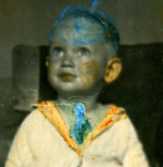В рассказе Брэдбери «И грянул гром» есть впечатляющий риторический пассаж с таким заключением:
цитата
Раздавите ногой мышь — это будет равносильно землетрясению, которое исказит облик всей земли, в корне изменит наши судьбы. Гибель одного пещерного человека смерть миллиарда его потомков, задушенных во чреве. Может быть, Рим не появится на своих семи холмах. Европа навсегда останется глухим лесом, только в Азии расцветет пышная жизнь. Наступите на мышь — и вы сокрушите пирамиды. Наступите на мышь — и вы оставите на Вечности вмятину величиной с Великий Каньон. Не будет королевы Елизаветы, Вашингтон не перейдет Делавер. Соединенные Штаты вообще не появятся.
цитата в оригинале
The stomp of your foot, on one mouse, could start an earthquake, the effects of which could shake our earth and destinies down through Time, to their very foundations. With the death of that one caveman, a billion others yet unborn are throttled in the womb. Perhaps Rome never rises on its seven hills. Perhaps Europe is forever a dark forest, and only Asia waxes healthy and teeming. Step on a mouse and you crush the Pyramids. Step on a mouse and you leave your print, like a Grand Canyon, across Eternity. Queen Elizabeth might never be born, Washington might not cross the Delaware, there might never be a United States at all.
У Шатобриана в «Опыте о революциях» есть очень похожий по строению, значению и пафосу пассаж:
цитата
Veut-on se convaincre de cette fatalité qui règle tout, qui se trouve en raison dernière de tout, et qui fait que si vous retranchiez un pied à l'insecte qui rampe dans la poussière , vous renverseriez des mondes (ci) ? Supposez, pour un moment, que l'événement le plus frivole se fût passé autrement à Athènes qu'il n'est réellement arrivé ; qu'il y eût existé un homme de moins, ou que cet homme n'eût pas occupé la même place ; par exemple, Epycide l'emportant sur Thémistocle ? Xerxès réduisoit la Grèce en servitude : c'en était fait des Socrate, des Platon, des Aristote: le rusé Philippe vieillissoit sous le fouet de son maître , Alexandre mouroit sur le cothurne , ou brigand sur la croix tyrienne ; d'autres chances se développoient, d'autres États se levoient sur la scène ; les Romains rehcontroient d'autres obstacles à combattre ; l'univers étoit changé.
(DIFFERENCE GENERALE ENTRE NOTRE SIECLE ET CELUI OU s'oPERA LA REVOLUTION REPUBLICAINE DE LA GRÈCE. CHAPITRE LXVIIL)
В английском переводе, который мог читать Брэдбери:
цитата
Does any one wish to convince himself of this fatality by which every thing is regulated, so that if you tread upon an insect crawling in the dust, you overturn a world ? Suppose, for a moment, that the most frivolous occurrence had happened otherwise at Athens than it really did happen, that there had existed one man less, or that this man had not occupied the same station ; for instance, the counsel of Epycides prevailing against that of Themistocles, Xerxes would have reduced Greece to slavery. This would have been destruction to the doctrines of Socrates, Plato and Aristotle ; the crafty Philip would have grown old beneath the lash of his ruler ; Alexander would have died in the buskin, or perhaps upon the Tyrian cross as a brigand ; other chances would have ensued ; other states would have become conspicuous; the Romans would have had to contend with other obstacles, and the universe would have been changed.
(An historical, political, and moral essay on revolutions, ancient and modern, Chap. XLII)
В несовершенном русском переводе Дмитрия Воронова:
цитата
Желаете ли допустить судьбу, которая управляет всем, которая находится в последней причине всего и которая производит то, что ежели бы вы оторвали ногу у насекомого, пресмыкающегося в пыли, то тем разрушили бы миры? Предположите на минуту, что происшествие самое маловажное последовало бы иначе в Афинах, нежели как оно действительно случилось, что там был человек меньших дарований, или, что сей человек не занимал бы того самого места, например, Епицид был бы вместо Фемистокла? Ксеркс поверг бы Грецию в рабство; пропали бы Сократы, Платоны, Аристотели; хитрый Филипп состарился бы под бичом своего наставника; Александр умер бы на Котурне, или разбойником, на кресте Тирском; открылись другие позорища — явились на сцене другие государства; Римляне встретили другого рода препятствия: Вселенная тогда изменилась.
(Шатобриан. Опыт исторический, политический и нравственный о древних и новейших переворотах. Перевод Д. Воронова. Ч. 2. СПб., 1817. С. 84-85)
Разумеется, не «оторвали ногу», а «наступили на».





